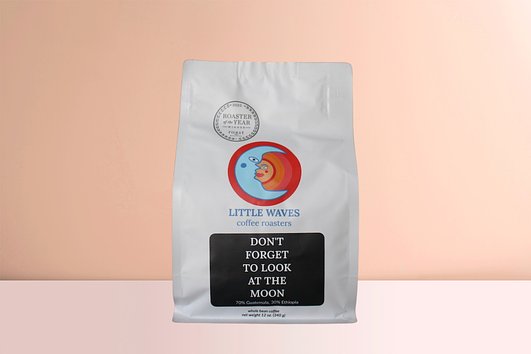How Long Does Coffee Last?
Matthew Berk
• October 28, 2021 — last updated January 23, 2026
While green (unroasted) beans can last for months, the clock starts ticking the minute the roaster finishes its work. Learn how to buy fresh coffee beans, how long coffee beans last and more.
How to Buy Fresh Coffee Beans
Here's how to ensure you're buying truly fresh coffee beans:
Quick Answer: How Long Coffee Stays Fresh
- Whole bean coffee: Best within about 2–6 weeks of the roast date
- Ground coffee: Best within about 1–3 weeks after grinding (or opening)
- Brewed coffee: Best the same day (or within 1–2 days refrigerated)
- Instant coffee: Lasts a long time if kept sealed and dry
- Buy Coffee from Bean Box: Enough said! We’re dedicated to delivering you the best quality beans, roasted to order and shipped fast. Peak freshness and flavor: we guarantee it.
- Go Directly to the Source: If you don’t buy it from us, buy it directly from the roaster. Coffee stocked through other middlemen, either online or on grocery store shelves, can sit for days, weeks, even months before you get it into your kitchen. This is why many artisan roasters won’t work with other coffee companies, or sell their beans through stores other than their own cafes.
- Look For a Roast Date: Look for a roast date on the coffee bag, and try to only buy coffee within a month of that date (and ideally within a week or two). If you see an “expiration date," know that many expiration dates are six months to a year after the beans have been roasted!
- Buy Whole Beans: Buy whole-bean coffee and grind the beans (preferably with a burr grinder) just before you brew.
How Long Do Coffee Beans Last?
When it comes to the shelf life of coffee beans, roast type plays a major role, and generally speaking, the darker the roast, the faster the decay.
Light Roasts: Lighter roasts can survive—when properly stored—for up to a month and beyond. This is because they don’t spend as much time in the roaster as dark beans. (Fun Fact: This is also why light roasts also tend to have more caffeine than dark roasts).
Dark Roasts: Longer roasting times introduce a new set of flavors, but also destroy the structural integrity of the bean. This means that dark roasts will age faster than lighter roasts (as evidenced by the shiny oils you’ll see appearing on these beans). However, the good news is that as coffees age, their lighter, brighter flavors fade first. So the darker roast may age faster, but you won’t notice as much of a flavor impact.
3 Ways to Tell If You Have Expired Coffee
As beans age and taste flattens, the coffee will start to lose its nuance, and taste more and more bitter. (Ironically, within the first week, many light roasts will taste sour, so don’t brew too soon, either!)
Oils: Depending on whether the beans are dark or light roast, seeing spots of oil on the surface can also tell you a lot. Very dark roasted coffee will exit the roaster already oily on the outside, even when perfectly fresh. But medium and light roasts should not show any visible oil on their surface when they're fresh. As beans age, the oils within the body of the bean will migrate towards the surface. And once the oils reach the exterior, exposure to the environment increases, as does the speed of decay.
Coffee Bloom: The coffee bloom—when hot water interacts with coffee still in the process of off-gassing—indicates fresh coffee, and is most obvious to see when using a brew method such as the Chemex, since you can clearly watch the coffee and water bubble up. Here’s how to do it: make your first pour of hot water just enough to saturate the grounds. The grounds will “fluff” up if the coffee is fresh, and you’ll see active bubbling at the surface. You should also see some slight rainbow effects (oil) on the surface of the bubbles. If you don’t see any rise, fluffing, or bubbling of the grounds, the beans are past prime.
Taste: Of course, the other major way to detect spoiled coffee is by drinking it. The most common indicator of stale beans is a very flat, “nothing” taste. If it tastes bitter, you can troubleshoot the issue with this list of possible causes for bitter coffee. If it tastes sour, it might be for one of these reasons. But in many cases, it’s likely that your coffee beans are old.
Can Ground Coffee Go Bad?
All coffee, especially ground coffee, can go bad. Because ground coffee has a lot more surface area to expose to the environment, it ages more quickly. Repeated exposure to air is the worst culprit for ground coffee, which happens when you have a large amount of ground coffee and the container is opened over and over every day for brewing.
If at all possible, buy your coffee whole bean, which keeps better, and only grind as much as you need, immediately prior to brewing. This part is so crucial that we always say: when spending money on coffee gear, the best bang your buck comes from a quality burr grinder. Check out our complete guide to brewing coffee beans here.
Can Brewed Coffee Go Bad?
Yes, coffee that sits too long—think drip coffee on hot plates at a dine—will begin to taste bitter. It's best to let your coffee cool a bit so you take in all of the tasting notes, then serve immediately.
How Long Does Coffee Last in the Fridge?
Storing your coffee in the fridge or freezer is okay and in some cases, may actually enhance the coffee. We don’t suggest leaving your coffee in the fridge or freezer for an extended period of time, however. And repeatedly thawing and re-freezing your beans isn’t advisable, because it will introduce moisture into the beans and cause freezer burn and bad flavors.
How to Store Coffee Beans
Packaging and storage influence shelf life for both whole beans and ground coffee. Bags that are flushed with nitrogen can stall bean spoilage, but only if they remain sealed. Also, bags lined with airtight materials (like all Bean Box bags!) prevent contact with the environment, preserving the life of the beans.
If your coffee bag doesn’t have any of these features, airtight containers and tins are the way to go.
Roast Date vs. “Best By” Date
If you’re shopping for coffee online or in-store, you may see a “best by” date instead of a roast date. A best by date is about shelf life, not peak flavor. For freshness, a roast date is more useful—especially if you care about getting the best taste out of your coffee.
And while stale coffee usually isn’t unsafe, it can lose aroma, sweetness, and clarity over time.
We want to help you make better coffee at home. Our recommendations are our own, and never sponsored. If you see something you love and buy it through our links, we may receive an affiliate commission (thanks for that!).







